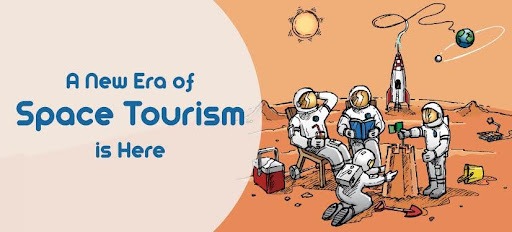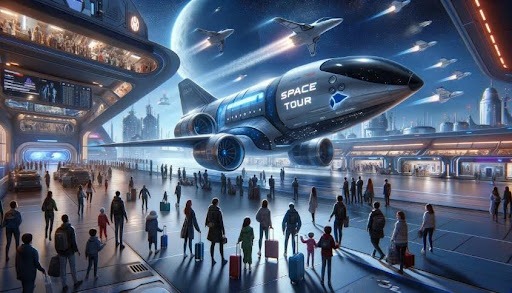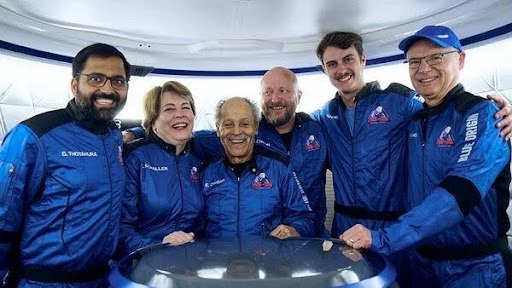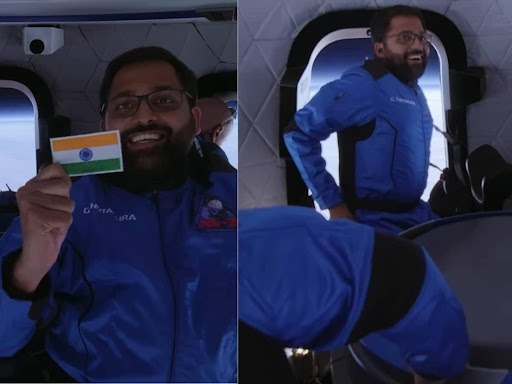Thanks to advancements in technology and the bold endeavours of visionaries like Jeff Bezos, Richard Branson, and Elon Musk, space tourism—once only found in science fiction—is now a real possibility. The idea of common people traveling beyond Earth is no longer just a pipe dream; thanks to Blue Origin’s successful launch, it’s getting closer to becoming a reality.
The promise that space tourism holds to allow common people to experience up close and personal the amazing beauty of space is what draws people in. Imagine yourself staring down from above and taking in the curvature of the world, the boundless emptiness of space, and the breathtaking views of the stars juxtaposed against the infinite cosmos.

It is an experience that cannot be described; it alters our perspective and makes us appreciate our place in the universe. The development of technology has been essential in making space tourism a viable industry. Reusable rocket technology is being used, along with advancements in spacecraft design and safety procedures, to provide the infrastructure required for commercial space travel.

In this technological revolution, SpaceX, Blue Origin, and Virgin Galactic are setting the standard, pushing the boundaries of innovation and paving the way for a time when space travel will be accessible to all people, not just the rich and famous.
In addition, the growing fascination with space travel is inspiring the next generation of space explorers and igniting a wave of enthusiasm for STEM education.
The fascination with comprehending the science underlying space travel will rise as more people take advantage of commercial space flights and expeditions to witness the wonders of space. This is a unique opportunity to foster scientific curiosity and ignite a passion for exploration among youngsters worldwide.
As we embark on this thrilling space voyage, it is critical to recognize that international cooperation is necessary to realize the full potential of space tourism. Governments, businesses, and research institutions working together is essential to promoting innovation and ensuring the infrastructure for space tourism grows sustainably as more nations participate in space exploration.
Blue Origin’s triumphant space tourism flight represents a significant breakthrough in humankind’s exploration of space. With each mission successfully completed, we get closer to a time when everyone with audacious ambitions can explore space, not just astronauts.

Holding up the Indian flag in space, Gopi Thotakura became the first tourist from India to travel on Blue Origin’s NS-25 mission, which is being led by Amazon billionaire Jeff Bezos. For the first time since its suborbital rocket was grounded in 2022, Blue Origin relaunched its much-discussed space tourism business on Sunday, sending a six-person crew from West Texas to the edge of space.
The 30-year-old Thotakura initially raised a banner that said, “I am an eco-warrior for our sustainable planet,” in a video that Blue Origin posted on social media. Then, inside the spacecraft, he declared, “India into space,” holding up a little Indian flag. As they float inside the spacecraft and gaze out the window at Earth below, the six space travelers can be seen beaming with excitement.

After takeoff, the astronauts’ capsule made its way back to Earth in around ten minutes. Jeff Bezos, the CEO of Blue Origin, has personally travelled to the edge of space on his space company’s space tourist trip in 2021. After Rakesh Sharma in 1984, Thotakura was the second Indian to travel into space as a space tourist.
In the end, Let’s embrace the wonders of the cosmos with open arms and embark on this amazing journey as a team as we near the commencement of a new chapter in space exploration.
—
If you like the blog, enrol your school or yourself (k-12 student) in our School Programs or Online Programs, call us at +91-74020 74020 or write to us for any query: getintouch@space-india.com

